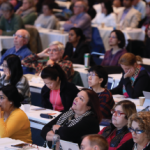We invite you to join your colleagues for this advanced topics course on interprofessional management of juvenile idiopathic arthritis and rheumatoid arthritis at the 2016 ACR/ARHP Annual Meeting in Washington, D.C., on Saturday, Nov. 12 from 7:45 a.m.–4:15 p.m.
The ARHP Clinical Focus Course, titled, Management of Rheumatoid Arthritis Across the Lifespan: A Case-Based Approach, is a daylong session that combines the expertise of a team of interprofessional clinicians who will address the various challenges patients with inflammatory and rheumatoid arthritis face at every phase of their lives. Through this interactive, progressive, case-based course, participants will develop strategies to help patients manage unique barriers to access to care and adherence, and integrate distinct preventive measures to reduce comorbidity.
Annelle B. Reed, MSN, CPNP, a pediatric nurse practitioner at the Children’s Hospital of Alabama in Birmingham with more than 14 years’ experience in pediatrics, will give a presentation on inflammatory arthritis in the pediatric patient.
Karla Jones, RN, MS, a pediatric nurse practitioner in the Rheumatology Clinic at Nationwide Children’s Hospital in Columbus, Ohio, will address issues pertinent to effectively transitioning young adults with juvenile-onset arthritis to the care of adult rheumatology providers. Her presentation will focus on developmental issues in adolescents as they relate to transition, teaching self-management skills to teens, incorporating key elements of a transition program into practice and identifying available transition resources.
John M. Davis III, MS, MD, will provide a comprehensive summary on treat to target, barriers to care, comorbidities and secondary prevention in the adult with rheumatoid arthritis (RA). Dr. Davis is an associate professor of medicine at the Mayo Clinic College of Medicine and the current practice chair and vice chair of the Division of Rheumatology at Mayo Clinic in Rochester, Minn. Dr. Davis’ research focuses on developing better ways to assess patients with RA, better serve personalized medical decision-making and, ultimately, improve patient outcomes.
Linda Li, BSc, PT, MSc, PhD, professor and Harold Robinson/Arthritis Society Chair at the Department of Physical Therapy, University of British Columbia, and senior scientist at Arthritis Research Canada, will discuss the integration of technology in RA management throughout life to promote physical activity. The evidence supporting a physically active lifestyle among people with arthritis is compelling. Many patients, however, do not meet the minimum recommended amount of physical activity, and evidence suggests individuals with persistent pain may be particularly vulnerable to inactivity. In people with arthritis, pain and fatigue are the major barriers to exercise. It is known that people with arthritis are less active during their leisure time compared with the general population. This presentation will provide information on the use of self-monitoring tools to promote a physically active lifestyle and weight management, and will end with findings from a qualitative study in three Canadian provinces on the views and experiences of patients and health professionals on the use of physical activity monitoring technologies in arthritis care. A key finding is the discrepancy in how the two groups perceived the ability of monitoring tools to motivate users, the sustainability of these tools and how they were changing patient-health professional interactions.
The final session of the day will focus on the management of the older adult with RA. Beth Resman-Targoff, Pharm.D., FCCP, is a clinical professor in the Department of Pharmacy, Clinical and Administrative Sciences at the University of Oklahoma College of Pharmacy. Dr. Resman-Targoff works with in-patient adult medicine teams at the Oklahoma University Medical Center. This session will highlight management of older adults with RA whose clinical presentation and management may differ based on the onset of the disease. Because randomized controlled studies often exclude elderly patients with RA because of their age or comorbidities, limited data exist on these patients, most of which are derived from registries. These patients may receive suboptimal treatment due to fear of adverse events, but the goals for these patients, as for younger patients, should be remission or low disease activity. The pharmacokinetic changes that occur in the elderly and other evidence regarding use of drugs to treat RA in geriatric patients will be reviewed, along with the impact of comorbidities on management of RA.
Learn more about the Clinical Focus Course and register. Note: An additional fee beyond scientific registration is required.
Maura Iversen, BSc, PT, DPT, SD, MPH, is an associate editor of The Rheumatologist. She is also professor and chair of the Department of Physical Therapy, Movement and Rehabilitation Sciences at Northeastern University, a behavioral scientist in the Division of Rheumatology, Immunology, and Allergy at Brigham and Women’s Hospital, and a lecturer at Harvard Medical School, Boston.



